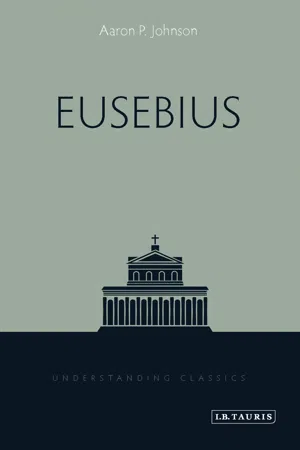Eusebius of Caesarea (c. 260–339 CE) is one of the most important intellectuals whose writings survive from late antiquity. His texts made lasting and wide-ranging contributions, from history-writing and apologetics to biblical commentary and Christian oratory. He was a master of many of the literary and scholarly traditions of the Greek heritage. Yet he left none of these traditions unaltered as he made brilliant and original experiments in the many genres he explored.
Aaron P. Johnson offers a lively introduction to Eusebius’ chief oeuvre while also discussing recent scholarship on this foundational early Christian writer. Placing Eusebius in the context of his age, the author provides a full account of his life, including the period when Eusebius controversially sought to assist the heretic Arius. He then discusses the major writings: apologetic treatises; the pedagogical and exegetical works; the historical texts; the anti-Marcellan theological discourses; and expositions directly connected to the Emperor Constantine.
AARON P. JOHNSON is Assistant Professor of Humanities and Classics at Lee University, Cleveland, Tennessee. He is the author of Ethnicity and Argument in Eusebius’ Praeparatio Evangelica (2006) and of Religion and Identity in Porphyry of Tyre: The Limits of Hellenism in Late Antiquity (2013).
Aaron Johnson is one of the best among the new wave of scholars who are giving us an entirely new way of looking at Eusebius of Caesarea. His book is far more than an introduction: it is a powerful, original and authoritative presentation of one of the most important contributors to the intellectual development of Christianity. Drawing on his impressive command of pagan philosophy, late antique culture and Christian theology, Johnson shows just how crucial Eusebius’ works were and why, both in his own day and for future generations including our own.
—Averil Cameron, DBE, FBA, Professor of Late Antique and Byzantine History, University of Oxford, formerly Warden of Keble College
In his new book, Aaron Johnson explores the many facets of the amazing scholar–theologian, Eusebius of Caesarea – apologist, exegete, historian, theologian and encomiast. With his fresh and uncluttered approach, Johnson demonstrates how different facets of the bishop relate to each other, and builds up a credible picture of Eusebius that will surprise many.
—Andrew Louth, FBA, Professor Emeritus of Patristic and Byzantine Studies, Durham University, and Visiting Professor of Eastern Orthodox Theology, Vrije Universiteit, Amsterdam
Understanding Classics
Editor: RICHARD STONEMAN (UNIVERSITY OF EXETER)
When the great Roman poets of the Augustan Age – Ovid, Virgil and Horace – composed their odes, love poetry and lyrical verse, could they have imagined that their works would one day form a cornerstone of Western civilization, or serve as the basis of study for generations of schoolchildren learning Latin? Could Aeschylus or Euripides have envisaged the remarkable popularity of contemporary stagings of their tragedies? The legacy and continuing resonance of Homer’s Iliad and Odyssey – Greek poetical epics written many millennia ago – again testify to the capacity of the classics to cross the divide of thousands of years and speak powerfully and relevantly to audiences quite different from those to which they were originally addressed.
Understanding Classics is a specially commissioned series which aims to introduce the outstanding authors and thinkers of antiquity to a wide audience of appreciative modern readers, whether undergraduate students of classics, literature, philosophy and ancient history or generalists interested in the classical world. Each volume – written by leading figures internationally – will examine the historical significance of the writer or writers in question; their social, political and cultural contexts; their use of language, literature and mythology; extracts from their major works; and their reception in later European literature, art, music and culture. Understanding Classics will build a library of readable, authoritative introductions offering fresh and elegant surveys of the greatest literatures, philosophies and poetries of the ancient world.
Understanding Classics
Aristophanes and Greek Comedy
JEFFREY S. RUSTEN ∙ Cornell University
Augustine
DENNIS E. TROUT ∙ Tufts University
Cicero
GESINE MANUWALD ∙ University College London
Euripides
ISABELLE TORRANCE ∙ University of Notre Dame
Eusebius
AARON P. JOHNSON ∙ Lee University, Tennessee
Homer
JONATHAN S. BURGESS ∙ University of Toronto
Latin Love Poetry
DENISE MCCOSKEY & ZARA TORLONE ∙ Miami University, Ohio
Martial
LINDSAY WATSON & PATRICIA WATSON ∙ University of Sydney
Ovid
CAROLE E. NEWLANDS ∙ University of Wisconsin, Madison
Pindar
RICHARD STONEMAN ∙ University of Exeter
Plutarch
MARK BECK ∙ University of North Carolina, Chapel Hill
The Poets of Alexandria
SUSAN A. STEPHENS ∙ Stanford University
Roman Comedy
DAVID CHRISTENSON ∙ University of Arizona
Sappho
PAGE DUBOIS ∙ University of California, Berkeley
Seneca
CHRISTOPHER STAR ∙ Middlebury College
Sophocles
STEPHEN ESPOSITO ∙ Boston University
Tacitus
VICTORIA EMMA PAGÁN ∙ University of Florida
Virgil
ALISON KEITH ∙ University of Toronto
Published in 2014 by I.B.Tauris & Co Ltd
6 Salem Road, London W2 4BU
175 Fifth Avenue, New York NY 10010
www.ibtauris.com
Distributed in the United States and Canada Exclusively by Palgrave Macmillan
175 Fifth Avenue, New York NY 10010
Copyright © 2014 Aaron P. Johnson
The right of Aaron P. Johnson to be identified as the author of this work has been asserted by him in accordance with the Copyright, Designs and Patents Act 1988.
All rights reserved. Except for brief quotations in a review, this book, or any part thereof, may not be reproduced, stored in or introduced into a retrieval system, or transmitted, in any form or by any means, electronic, mechanical, photocopying, recording or otherwise, without the prior written permission of the publisher.
ISBN: 978 1 78076 555 6 (HB)
978 1 78076 556 3 (PB)
eISBN: 978 0 85773 465 5
A full CIP record for this ...



